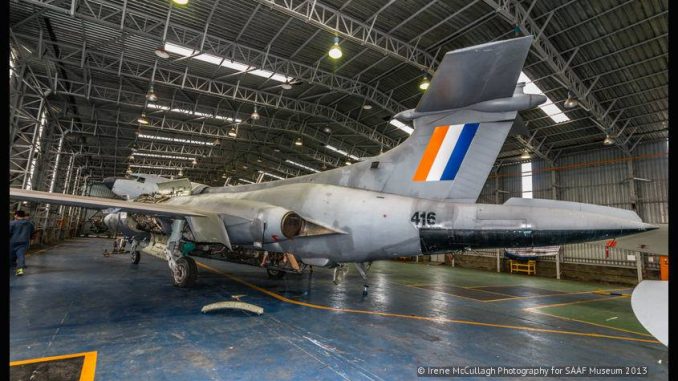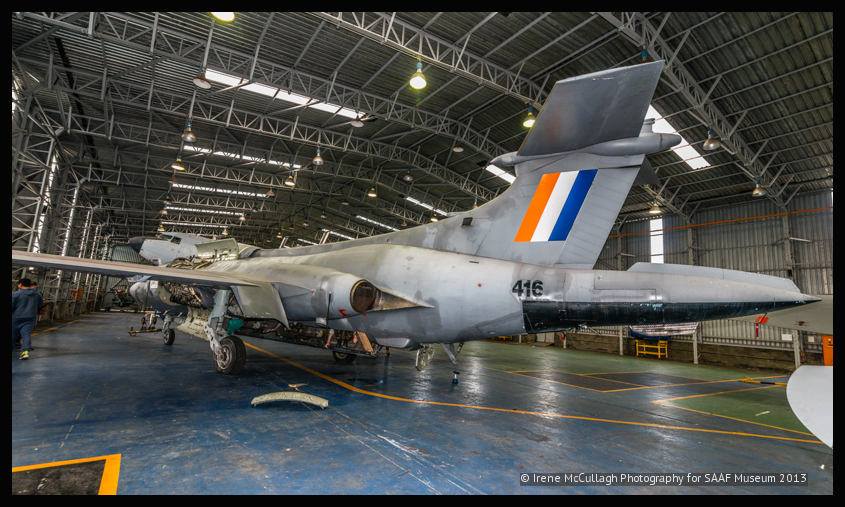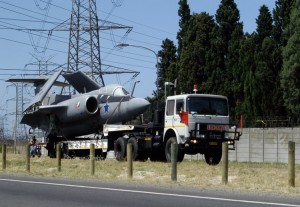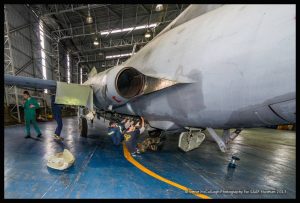

(Image Credit: Irene McCullagh / SAAF Museum)
The Friends of the SAAF Museum located at AFB Ysterplaat in Cape Town, South Africa are in the process of restoring a Blackburn Buccaneer. One of sixteen S.50 Buccaneer variants flown by the South African Air Force (SAAF), Buccaneer 416 had a long career flying for the SAAF, serving from 1965 to 1991 when its type was retired from active duty.
Buccaneer S.50 variants differed from those destined to serve in the armed forces of the United Kingdom with modifications for the conditions they would face in South Africa. The planes were equipped with stronger undercarriages, bigger brakes and manual rather than automated folding wings and provisions for mounting rocket engines to provide additional thrust for takeoffs from the hot and high airfields like AFB Waterkloof in Pretoria, where the type was mostly based. Other changes to the base specification included provisions for in-flight refueling and larger underwing fuel tanks.

(Image Credit: Norman Tinkler)
Upon its retirement in 1991, 416 was placed on loan by the SAAF Museum to Thunder City at Cape Town International Airport, which at the time was a private operator of ex-military jets that provided flight experiences to the public as well as air show performances. For unspecified reasons, 416 along with a number of other planes on loan from the SAAF were pulled from Thunder City by the SAAF in the early part of this century, and while the other planes were moved to Ysterplaat, 416 was left on a tarmac at Cape Town International Airport. It took Norman Tinkler, the chairman of Friends of the SAAF Museum, nearly four years of campaigning to get the 416 moved to AFB Ysterplaat for his group to perform a restoration project that will see the plane brought to static display standards.

(Image Credit: Irene McCullagh / SAAF Museum)
While the move was approved in January of 2010, the biggest problem the group faced was the manufacturing of transport cradles and approval permits from local authorities. The plane finally arrived at Ysterplaat on December 2, 2012 and the restoration project got underway in May 2013 when the group was assigned a hanger in which to work. Headed by Team Leader, Jon Durant, who previously oversaw the restoration of an F86 Sabre for the Museum, the group of volunteers working Saturday mornings expect the restoration to take about 3 years, and cost in the region of R 25,000.00 ZAR (about $2,500 USD), funded by the Friends of the SAAF Museum and private donations. Those interested in following the progress of the restoration can join the group’s Facebook page.



Nice article, I’d just like to point out that the name is AFB Ysterplaat and not AFB Ysterplatt.
Hey Nathan,
Thanks for catching the typos, I think we corrected them all.
Roger
ps Jon not john
John is now Jon, John.
Thanks!
Thought you might be interested; I’m currently a GT student at BCIT in Vancouver Canada.
We’ve just started to “overhaul” a Rolls-Royce Spey Mk 101.
According to the SAAF log book our engine, S/N 10018, ended it’s working life on 416.
It been fascinating learning about the history of our engine!